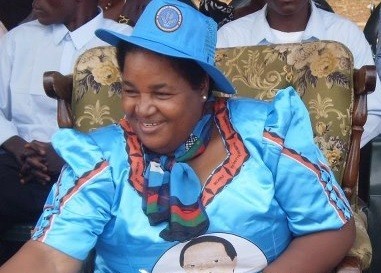The World Breast feeding Week is a special week that is set aside globally to promote, support and protect breast feeding as the natural and best way of feeding infants and young children.
It is celebrated during the first week of August every year with a theme that is deliberately chosen at global level to draw the attention of parents, caregivers, communities, service providers, policy makers and the general public on the recommended infant and young child feeding practices that are vital in improving child survival, growth and development.
This year’s theme is “BREASTFEEDING: A winning Goal for Life” This responds and contributes to the latest Millennium Development Goal countdown of reducing Child Mortality. It asserts the importance of increasing and sustaining the protection, promotion and support of breastfeeding in the post 2015 agenda, and engaging as many groups, and people of various ages as possible.
The objectives this year are:
• To provide information on millennium development goals and how they relate to breast feeding and Infant and Young Child Feeding (IYCF)
• To show-case progress made so far and the key gaps in breastfeeding and IYCF
• To call attention to the importance of stepping up actions to protect, promote and support breastfeeding as a key intervention in the MDGs and in the post 2015; era
• To stimulate interest among young people regardless of gender to see the relevance of breastfeeding in today’s changing world
Ladies and gentlemen,
Some of the things that can be done to promote, protect and support breastfeeding in relation to the MDGs include:
• The need to work as a team: identify our allies and team-mates
• set common goals
• identify roles
• prepare training programmes as needed
• cater for individual needs
• prepare strategy
• carry out plans, evaluate progress, have back up plans
• and celebrate successes and appraise afterwards to learn lessons for follow-up actions.
In Malawi, ladies and gentlemen, we have had both achievements and challenges in trying to promote, protect and support breastfeeding in the past two to three decades.
Some of the achievements that we have made include:
• Raised breast feeding rates from 3% in 2002 to 71.3 % in 2010 and advocacy for breastfeeding has contributed to reduction of stunting from 53% to 47 %.
• This has been coupled with the provision of the 90 days maternity leave for working mothers to be able to breastfeed and take good care of infants and young children during the first three months.
However, ladies and gentlemen, we have also in the process faced some challenges in the sense that:
• The Ministry is struggling to keep hospitals baby friendly due to limited resources
• There is low commitment at different levels
• There are still some c negative cultural and Social Attitudes towards breast feeding
Ladies and gentlemen,
Allow me to emphasize that the promotion and protection of breastfeeding is fundamental in the fight for the survival and development of children around the globe. Here in Malawi, only 73 out of every 100 mothers exclusively breastfeed their children. Although this is a slight improvement from previous years, there is still a long way to go to make sure that all children in Malawi are well protected in their early stages of life.
Optimal breastfeeding in the first two years of life, and particularly exclusive breastfeeding for the first six months, will have the single largest impact on child survival of all preventive interventions, with the potential to prevent 12 to 15 per cent of all under five deaths in the developing world.
Ladies and gentlemen,
Breast milk provides the ideal nutrition for infants. It has a nearly perfect mix of vitamins, protein, and fat — everything your baby needs to grow. And it’s all provided in a form more easily digested than infant formula.
Breast milk contains antibodies that help your baby fight off viruses and bacteria. Breastfeeding lowers your baby’s risk of having asthma or allergies. In addition, babies who are breastfed exclusively for the first 6 months, without any formula, have fewer ear infections, respiratory illnesses, and bouts of diarrhea. They also have fewer hospitalizations and trips to the doctor.
In addition, ladies and gentlemen,
Breastfeeding has been linked to higher IQ scores in later childhood in some studies. What’s more, the physical closeness, skin-to-skin touching, and eye contact all help your baby bond with the mother and feel secure. Breastfed infants are more likely to gain the right amount of weight as they grow rather than become overweight children. The AAP says breastfeeding also plays a role in the prevention of SIDS (sudden infant death syndrome). It’s been thought to lower the risk of diabetes, obesity, and certain cancers as well.
To make sure that exclusive breastfeeding is protected and promoted in Malawi and that a supportive environment is to be established for breastfeeding mothers, a strong partnership is needed; a partnership between the Government, the UN family non-governmental organizations and civil society at large.
We therefore also need a strong partnership between local authorities, health practitioners and communities. Everyone has a role to play and together we can make sure we create the utmost protective and supportive environment for exclusive breastfeeding.
In terms of planning for the Future, my Ministry intends to enhance the following interventions
• Baby Friendly Hospital Initiative (BFHI)
• Baby Friendly Community Initiative (BFCI)
• Pre-service Curriculum reviews
• Capacity Building
• Behavior change and Communication
Ladies and Gentlemen, a number of activities have been set at national level to kick start the activities to commemorate this year’s World Breastfeeding Week, one of which is this media briefing. It is believed that this will help to get the different media houses sensitized on this years’ theme and in turn feature and produce programmes and articles on this year’s world breastfeeding theme to have an effective publicity.
My Ministry therefore, would like to urge all of us to join the world in commemorating this year’s World Breast feeding Week.
Let me end by again expressing my profound appreciation for the commitment of the Government of Malawi and its partners to prioritize breastfeeding promotion as an important public health intervention.
WHO, UNICEF, USAID and all other partners, we look forward and count on your intensified action in the very near future and we count on your cooperation as well. The week is around the corner, so let’s get to work, to make sure that every child born in Malawi will be given a chance to survive, grow and develop into a healthy and strong young citizen.
Thank you very much and may God Bless you all




